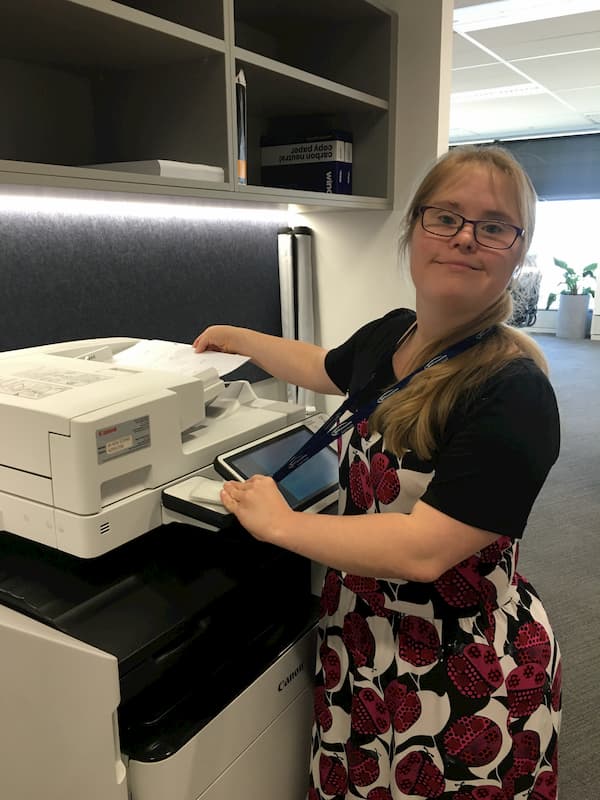Emma’s story: The benefits of it all coming together

Emma is in her early 30s and has worked as an admin assistant at NTT Ltd for over six years. Her role includes filing, scanning, collecting mail, wiping workstations, cleaning the kitchen and conference rooms, and restocking the coffee machine.
Emma has an intellectual disability and having a steady job has been a positive constant in her life, despite lots of changes like moving to a new house and COVID-19.
After Emma finished high school, she wanted to work in administration. She studied at TAFE to learn office skills and did a transition to work program. During this program, she learned about writing CVs, budgeting and doing interviews. She also did travel training.
In her early 20s, Emma did work experience in an office. Then, Emma’s mum Frances found her a job through her own personal networks and a Disability Employment Services (DES) provider supported Emma to work there. Sadly, this role ended when there was no longer enough work, but Emma had good family and professional support that helped her adapt to this change. Frances encourages parents to keep an eye out for opportunities and don’t be afraid to ask!
When Emma started working in her current role, she was working for a smaller organisation that later merged with another organisation to become NTT Ltd. This organisation had not previously hired staff with intellectual disability.
The DES provider negotiated Emma’s hours with the organisation, completed a site assessment and discussed her role and support needs. They also supported her with travel training and gave her onsite support to get to know the office, staff and tasks. As Emma became more confident, they gradually stepped back, but were available if Emma needed support.
NTT Ltd has also provided ongoing, collaborative support for Emma, Frances and her DES provider. They communicate regularly, which means small issues are resolved before they become big ones.
Emma is actively involved in her workplace and has made independent relationships with her colleagues both inside and outside of work. When she needs additional support, Emma’s DES provider can help.
Although Emma earns a set wage, her hours can vary, like during COVID-19. When this happens, Frances needs to let Centrelink know that her income has changed.
Emma knows that looking for work can be scary and said she feels shy when she meets new people., But she encourages people with intellectual disability who want a job to “just go forward” and “go with the flow”.
Frances says that Emma’s employment success comes from keeping a positive vision for her future, even when they weren’t sure how to get there. It also comes from good transition planning after high school.
“You don’t want to be in your 70s wondering what their future will be. Putting things in place early has meant we can live our lives while knowing Emma’s future will be fine.”
It has taken a lot of work to achieve Emma’s employment success, which Frances says she couldn’t have done without support.
“If this is what you want for your child, you need to surround yourself with supportive people who have been down this path.”
If you would like a job, but don’t know how to make the systems work for you, you can learn more here:


